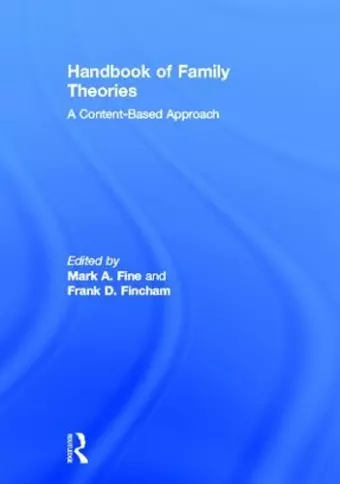Handbook of Family Theories
A Content-Based Approach
Frank D Fincham editor Mark A Fine editor
Format:Hardback
Publisher:Taylor & Francis Ltd
Published:7th Dec '12
Currently unavailable, our supplier has not provided us a restock date
This hardback is available in another edition too:
- Paperback£89.99(9780415657228)

Organized by content areas rather than by theory, this comprehensive, accessible handbook helps readers gain greater insight into how key theories have impacted today’s family research. Most competing books, organized by theory, do not provide a strong sense of the links between theory and research. Using the 2000 and 2010 decade-in-review issues of the Journal of Marriage and Family as a resource, the book addresses the most important topics impacting family studies research today.
The introductory chapter, written by the editors, provides an overview of the role family theories have had on the field. This chapter is followed by 23 others on family-related content areas written by renowned scholars in the field. The book is organized around the most important domains in the field: parenting and parent-child relationships, romantic relationships, conflict and aggression, structural variation and transitions, demographic variations, and families and extra-familial institutions. Each of the contributors describes how theory has been used to generate new knowledge in the field and suggests future directions for how theory may be used to extend our knowledge base. The book helps readers acquire a working knowledge of the key family science theories, findings, and issues and understand how researchers make use of these theories in their empirical efforts.
To maximize accessibility, each of the renowned contributors addresses a common set of issues in their chapter:
• Introduction to the content area
• Review of the key topics, issues, and findings
• A description of each of the major theories used to study that particular content area
• Limitations of the theories
• Suggestions for better use of the theories and/or new theoretical advances
• Conclusions about future theoretical developments.
An ideal text for graduate and/or advanced undergraduate family theories courses, this book’s unique organization also lends itself to use in content-based family studies/science courses taught in family studies, human development, psychology, sociology, communication, education, and nursing. Due to its comprehensive and current approach, the book also appeals to scholars and researchers in these areas.
“[This] is a book I would cherish and I believe it is one that students would eagerly read. ... These editors are leaders in the field and they are at the top of their game. .... It is in fact an act of generosity to the field. ... I would purchase it and ... recommend it to colleagues and ... require it as essential reading." – Thomas Bradbury, UCLA, USA
“This book, given its unique approach to linking theories with empirical applications, has the potential to become a central reference work [and] a valuable teaching tool. … One of the frustrations I have with teaching ... family theories ... is the “disconnect” between ... the theoretical approaches in the current graduate level texts and the empirical research. ... This text ... would fit well with my approach." – David Eggebeen, Pennsylvania State University, USA
“A book of this type has been long time coming! ... [It] does a tremendous job in getting the students to see the value and utility of theory in the research process. ... This manuscript captures many timely issues that are not included in other handbooks. ... This book will succeed in the marketplace, especially in programs emphasizing the study of families and their dynamics. I could also see many clinicians and therapeutic offices/programs benefiting from this book. ... It is appropriate for the graduate as well as undergraduate student. ... [The] authors of [the] chapters ... are “the” researchers ... in the field.” – Laura KM Donorfio, University of Connecticut, USA
“The book will be a huge success. …. I strongly believe that it will address a scholarly niche that is wide open. …. It will get used in Family Studies courses. Libraries and scholars will buy it. It will provide a very different take on the role of theory in research. … Students will learn how theories work by seeing first how they have been used to explain phenomena. ... I believe it will have a significant contribution to the field. ... [The] contributing authors ... reads like a who’s who in the field.” – Joe F. Pittman, Auburn University, USA
“[This book] contributes significantly to the field. … It should inspire scholars to advance their theoretical contributions and thus foster better theorizing in the … field. Graduate students should fine the book particularly helpful. … [The] chapters I reviewed are written in a clear and engaging manner. … I would … recommend [it] to … students and other family professionals.”Charles B. Hennon, Miami University, USA
“[This] … book … is needed … to illustrate … links between theory and research … to move the field forward … and … to overcome some of the limitations of textbooks/handbooks currently in use. … The editors … are eminent researchers in the field and have … assembled a list of … authors that are at the top of their … area of specialization. I would very much welcome this handbook and use it in my graduate family theories course.”-Sylvia Niehuis, Texas Tech University, USA
ISBN: 9780415879453
Dimensions: unknown
Weight: 1058g
512 pages